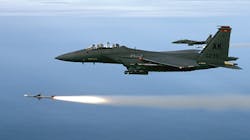EGLIN AIR FORCE BASE, Fla.-Missile experts at the Raytheon Co. are researching how to increase capabilities for next-generation air-launched tactical missiles under terms of a potential $14 million contract.
Officials of the munitions directorate of the U.S. Air Force Research Laboratory at Eglin Air Force Base, Fla., are asking researchers at the Raytheon Missile Systems segment in Tucson, Ariz., to increase the number of missiles carried on a single sortie, the effectiveness of each missile, and platform survivability against all threats in an anti-access, area denial (A2AD) environment.
Specifically, the Air Force as asking Raytheon to conduct additional research and development on the Small Advanced Capability Missile (SACM) and Miniature Self-Defense Munition (MSDM) concepts.
The SACM will support affordable, highly lethal, small size and weight ordnance with advanced air frame design and synergistic control capabilities for air dominance enabling high air-to-air load-out. The SACM project seeks to provide flexible hyper-agile airframes, high impulse propulsion, affordable wide-field-of-view seeker, anti-jam guidance integrated fuze, and aimable kinetic and non-kinetic effects.
The MSDM, meanwhile, will support miniaturized weapon capabilities for air superiority by enabling close-in platform self-defense and penetration into contested A2AD environments with little to no impact to payload capacity. The MSDM seeks to develop an affordable guidance system for a future air-to-air munition designed for aircraft self-defense. The project will develop a conceptual design for the optics and algorithms of an affordable seeker front end for an air-to-air weapon for aircraft self-defense.
The program involves aerodynamics, propulsion, warhead, and seeker front end. Cost is a primary driver. Raytheon experts will define system and subsystem requirements, explore design trades between subsystems and critical components, identify design risks, as well as model the launch aircraft, miniature self-defense munition, and two threats.
Raytheon will do the work in Tucson, Ariz., and should be finished by January 2021.
FOR MORE INFORMATION visit Raytheon Missile Systems online at www.raytheon.com, or the Air Force Research Lab Munitions Directorate at www.eglin.af.mil/units/afrlmunitionsdirectorate.

John Keller | Editor
John Keller is editor-in-chief of Military & Aerospace Electronics magazine, which provides extensive coverage and analysis of enabling electronic and optoelectronic technologies in military, space, and commercial aviation applications. A member of the Military & Aerospace Electronics staff since the magazine's founding in 1989, Mr. Keller took over as chief editor in 1995.

